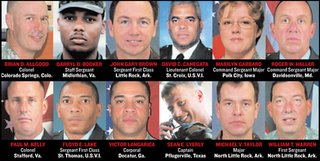Black Hawk Down: The True Cost of War

This Newsweek piece is a must read. The stories of these soldiers should be all over the news. Instead, we're bombarded with shallow debates about presidential candidates, Miss America, Donald Trump's feud with Rosie O'Donnell, and Bush having fun in a Caterpillar tractor.
Please take the time to read this article and send it around. It's about the 12 soldiers who died on Saturday after their helicopter crashed. According to the report, officials tentatively blamed an equipment malfunction, then enemy fire. Now they say the crash is under investigation. Ten of the soldiers were members of the National Guard. It's a shame similar articles aren't being written about the Iraqi people.
More than 3,000 U.S. service members have now died in the Iraq war. At first it was difficult not to feel overwhelmed by the number of deaths. After four years, it is now difficult not to feel numb. In a nation without a draft, the emotional connection between the front and the home front is the weakest it has been in a major conflict in recent memory. There are so many news accounts of troops killed in combat that the details blur. The death of one soldier, or 20, loses its power to shock, except to the families of the fallen.
At some point, the way we talk about the war itself changes. We speak less and less about husbandless wives and parentless children, and instead obscure the suffering in vaguer, more distant and—guiltily—easier terms. We shake our heads and talk about the "losses."
There are, as always, more questions than answers about what to do in Iraq. Honest people can disagree about whether it is more dangerous to stay or to leave. But the 12 Americans who died in the Black Hawk crash offer us a vivid reminder of what is happening on the battlefield, and of the cost so many families are paying when loved ones die in combat. Guard members have taken on much of the burden of this war, and those who died aboard that helicopter were like many others who have lost their lives in the fighting: ordinary people asked to do the extraordinary. They were husbands and wives, parents and even grandparents. Some relied on their faith in God, others, their faith in the commander in chief. At least one no longer believed the war was worth fighting, but carried out his duties. Together, they left behind 34 children and at least a dozen grandchildren.
As we contemplate sending more men and women like them into harm's way, their demise leaves behind perhaps the only question that truly matters in wartime: is it worth it?

0 Comments:
Post a Comment
<< Home